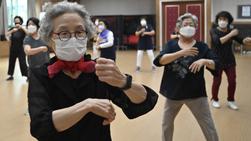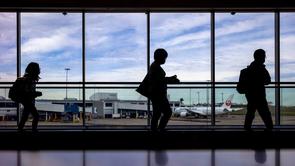 Elderly women wearing face masks attend a dance class re-opened for the first time since the COVID-19 coronavirus pandemic at Seodaemun Senior Welfare Centre in Seoul on July 1, 2021. (JUNG YEON-JE / AFP)
Elderly women wearing face masks attend a dance class re-opened for the first time since the COVID-19 coronavirus pandemic at Seodaemun Senior Welfare Centre in Seoul on July 1, 2021. (JUNG YEON-JE / AFP)
KUWAIT CITY / TEHRAN - South Korea will start offering booster shots to “high-risk groups,” including people over 60 and medical workers, Prime Minister Kim Boo-kyum said during a COVID-19 response meeting, adding that the country also plans to expand vaccine eligibility to teenagers and pregnant women.
Three-quarters of the population have received at least one vaccine dose, with less than half fully vaccinated, according to the Korea Disease Control and Prevention Agency’s website Sunday. The Seoul metropolitan area remains under the government’s strictest social distancing measures.
Three-quarters of the population have received at least one vaccine dose, with less than half fully vaccinated, according to the Korea Disease Control and Prevention Agency’s website Sunday
South Korea's daily COVID-19 cases hit a record high in the aftermath of the Chuseok holiday on Saturday.
The country reported 3,273 more cases of COVID-19, lifting the total number of infections to 298,402, according to the Korea Disease Control and Prevention Agency.
It topped the previous daily high of 2,431 tallied in the prior day, surpassing 3,000 for the first time since the first case was found here in January last year.
Australia
Australian Prime Minister Scott Morrison said state premiers must not keep borders closed once agreed COVID-19 vaccination targets are reached.
“We can’t stay in second gear,” he said on a Sunday morning television program. “We’ve got to get to top gear in living with the virus.”
State governments where COVID-19 cases are low, such as Queensland and Western Australia, have been reluctant to open their borders. Morrison says that will need to change when fully-vaccinated rates reach 80 percent, which he expects to happen before the end of the year.
“I can’t see any reason why Australians should be kept from each other,” the leader said. “And so that puts a heavy, heavy responsibility on those who would seek to prevent that from happening.”
 Travelers are seen at Sydney International airport on June 23, 2021 in Sydney, Australia. (PHOTO / BLOOMBERG)
Travelers are seen at Sydney International airport on June 23, 2021 in Sydney, Australia. (PHOTO / BLOOMBERG)
Supply issues have restricted the country’s vaccination rates, with about 51 percent of Australians older than 16 having received both jabs.
On Sunday, Australia’s second most populous state Victoria reported 779 new local cases of COVID-19, a day after adding its highest daily figure since the beginning of the outbreak. New South Wales recorded 961 new infections.
Speaking on Australian television’s Weekend Sunrise program after meetings with leaders from the Quad group in Washington, Morrison said there is a used-by date on COVID-19 restrictions.
“There comes a time when you’ve got to honor the arrangement you’ve made with the Australian people, and that is when you get to 80 percent vaccination, it’s very clear that you can start opening up,” he said. “That’s what Australians want. We have that arrangement with them, get yourself vaccinated and we can ensure that Australia can go forward and not be held back by the strong controls we’ve had to live with.”
ALSO READ: Australia borders to be open by Christmas, tourism minister says
Morrison also said that his government has been working on their sustainable climate policy plan to achieve net zero emissions by 2050. He says he intends to achieve the emission targets without having to tax people.
“We can do it without having to shut down our industries and regions,” he said.
Indonesia
A shortage of healthcare workers and logistical flaws are hampering Indonesia’s efforts to inoculate its people against COVID-19, leaving the world’s largest archipelago trailing its neighbors despite being among the first in Southeast Asia to start the program.
Only 17.9 percent of Indonesia’s 270 million people are fully vaccinated, behind almost every major economy in the region, according to Bloomberg Vaccine Tracker. About 32 percent have received their first dose, placing the nation among the bottom four on the list.
“Supply at the national level is no longer an issue, getting shots into the arms of the people is,” said Griffith University epidemiologist Dicky Budiman, who is assisting the government in improving vaccination coverage. “Even in East Java, where there is sufficient stocks, there isn’t enough vaccination booths and not enough vaccinators on site to deliver the shots.”
The slow inoculation progress risks Indonesia’s efforts to keep the pandemic under control and sustain the fragile recovery of its $1.1 trillion economy. A new outbreak caused by the more contagious delta variant forced the government to reimpose its strictest mobility curbs at the start of the third quarter, with the restrictions helping bring down its weekly death count to the lowest since mid-April.
The nation is slowly building up its COVID-19 vaccine stocks after a shaky start earlier this year, and has so far received 273.6 million doses, some in the form of bulks that need further processing, the information ministry said in a statement Friday. The government targets inoculating 208 million people across the country.
The administration is setting up more vaccination centers with help from the police, army, and intelligence personnel, educating those who are still hesitant and improving data tracking via an app, COVID-19 task force spokesman Wiku Adisasmito said in an interview on Thursday. With an aim of administering more than 1 million shots a day, the government expects to reach 70 percent coverage before the end of the year.
Iran
The Iranian Health Ministry reported on Saturday 10,843 new COVID-19 cases, taking the country's total infections to 5,519,728.
According to a briefing released by Iran's Ministry of Health and Medical Education on its official website, the pandemic has claimed 119,072 lives in the country so far, after 280 new deaths were registered in the past 24 hours.
READ MORE: Iran imposes tougher curbs as daily virus toll hits record high
A total of 4,920,978 people have recovered from the disease or been discharged from hospitals across the country, while 6,411 remain in intensive care units, it said.
By Saturday, 34,569,680 Iranians have received their first doses of COVID-19 vaccines, while 15,219,824 have taken two doses.
Iran has been recently facing a surge of the Delta variant of the coronavirus.
Kuwait
Kuwait has approved a booster dose of COVID-19 vaccine and will start administering it in the country, spokesman of the Kuwait's Health Ministry said on Saturday.
Based on the results of relevant studies, and in order to mitigate the high risks of new COVID-19 variants, the ministry decided to provide the booster doses, Abdullah Al-Sanad said in a statement.
The third jabs will be given to three groups at the moment, namely those aged over 60 with underlying health conditions, those most vulnerable to infection risks such as front-line workers, and the immunocompromised people, he noted.
Citizens and residents will make their appointments this week, and the boosters can be given as long as it has been at least six months after completion of two doses, he said.
Kuwait registered on Saturday 41 new COVID-19 cases, raising the total infections in the country to 411,447. The ministry also announced one more fatality, taking the death toll to 2,445, while the tally of recoveries rose by 55 to 408,338.
Philippines
China delivered an additional batch of Sinovac CoronaVac vaccines to the Philippines on Sunday to support the Southeast Asian country's COVID-19 vaccination campaign.
China has been delivering CoronaVac to the Philippines since Feb 28. It was the first to provide coronavirus vaccines to the Philippines, allowing the country to kick off its vaccination drive on March 1.
The Philippines has administered over 43.8 million doses of COVID-19 vaccines. More than 20 million people have been fully vaccinated. The government aims to vaccinate up to 70 million people this year.
To date, the Philippines has received almost 70 million doses of COVID-19 vaccines from different vaccine makers. China remains the country's biggest vaccine supplier.
The Philippines now has nearly 2.5 million confirmed COVID-19 cases, including 37,405 deaths.


